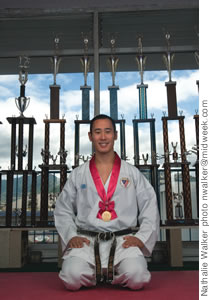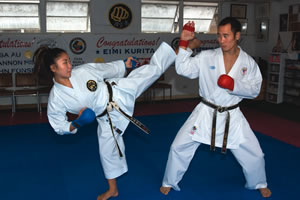Going out on Top
George Kotaka retires from competition after winning his second world karate championship, bringing him closer to his legendary father. Thirty-one years of age is rather young to retire. But when you’ve spent the better part of your life fighting and preparing for such encounters, the time quickly comes when your body says enough is enough.

By .(JavaScript must be enabled to view this email address)
E-mail this story | Print this page | Archive | RSS |
 Del.icio.us
Del.icio.us
Thirty-one years of age is rather young to retire. But when you’ve spent the better part of your life fighting and preparing for such encounters, the time quickly comes when your body says enough is enough.
After more than two decades of training, George Kotaka, the only American male to have twice claimed karate’s biggest prize, will no longer square off against the world’s best. Much like his legendary father, Chuzo, MidWeek‘s cover subject in September 1995, who helped turn karate into a global sport, he will now focus his energies on teaching and, perhaps, training Hawaii’s next champion. It was a decision years in the making.
Kotaka says he first considered retirement after failing to win in 2006. The World Karate Championships are held every two years and training for the event begins when one contest ends. But after succeeding in an event that invites 800 of the world’s best to battle for supremacy, pride can get in the way. Lucky for American karate, he came back for one more shot. That the 2008 championship was to be held in Japan was another draw.
“I really want to focus on teaching. I want to pass that knowledge on to my students,” says Kotaka. “I really wanted to retire there. But after losing you still feel like you want to win again. You have that competitiveness, but it’s a fine line between are you over the hill or are you chasing the dream because it’s more ego talking, or if you actually have it. I really had to deal with things in my head.”
Kotaka began studying karate as a 3-year-old in his father’s dojo for reasons that he obviously doesn’t remember. Two years later he took part in his first competition, discovering the drive that would one day push him to become one of Hawaii’s “Superkids.”

|
The future world champion’s first claim to fame came in 1988 as an 11-year-old when he was featured on a popular TV program highlighting Hawaii’s talented keiki. It was there he made his future plans public for world domination.
“Since about then I wanted to be the best in the world, whatever that meant at the time, whether it was national champion or world champion,” he says, “I just wanted to be the best and I felt that, with the right training and the right attitude, I could maybe one day accomplish that.”
At this same age he competed in and won his first national competition. The contest showed the young man how good he could one day become.
“This was a big thing for me,” he recalls. “That’s when I really kind of knew that I could compete with the rest of the nation. For me to win that, it said that I could do this.”
Victories on such a stage became routine for Kotaka, who has never lost a national event.
Not that he’s been perfect in all his outings.
“I’ve done my fair share of losing in international competition,” he explains with a smile.
Kotaka’s first venture into the sport’s top tier came at the age of 19, and the skill level he encountered at the world championship was surprising. Kotaka fought once, lost and was sent home.
“It was the biggest shock I ever had,” he says. “When you come in from a junior, 18, 19, you’re still pretty young. When you get into the men’s division it is something totally different. I don’t think, physically, I was mature enough. It really showed me what I needed to work on. It was good that I lost.”

|
Two years later he returned and made it to the bronze medal match , where once again he tasted defeat. The next time, the bronze was his.
Finally in 2002 he reached the pinnacle of his sport. After years of work, George Kotaka was the world’s best at his weight class. After falling short in both 2004 and ‘06, he was once again successful in his quest for gold last year. And he had, in some way, Michael Phelps to thank for that.
“I got so much of my inspiration by watching the Olympics in Beijing,” he says. “Watching Michael Phelps do what he did in the pool was mind-boggling. If he can do that in eight events and train that vigorously, (I knew I’d) better start training a lot harder, no excuses. Just to see all those Americans motivated me to train that much harder.”
Though his first championship was important, it was this one, his last and the one earned in the homeland of his father, that was truly special. Kotaka went out on top, and the win helped to bring father and son closer together.
Though George and his father Shihan Chuzo Kotaka shared a common bond through martial arts, the two were never close on a personal level.
“My dad is real samurai type,” he says. “If you first met him, you may not want to talk to him. He may not seem approachable. I’ve never been really, really close with my father. It has been more of an understanding. He’s not much of a personable person. But it (the win) has brought us much closer. If it hadn’t been for that (karate) I really don’t know what it would be like.”
George says he understands that his father’s distant demeanor is a product of his youth and not from any lack of caring about his son. Life for many, if not most, in post-World War II Japan was difficult. The fighting decimated the country, and basic necessities were hard to come by.
“He came from the old school sensei, and they look pretty intense,” says George of his father. “They really keep to themselves and have that really stern look. But also I think it’s just being brought up during the
Page 1 of 2 pages for this story 1 2 >
E-mail this story | Print this page | Comments (0) | Archive | RSS
Most Recent Comment(s):








